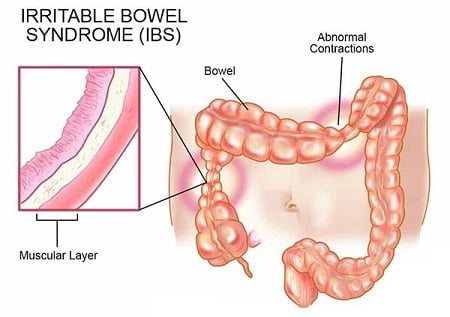Irritable Bowel Syndrome

Treatments
Irritable Bowel Syndrome
Irritable Bowel Syndrome (IBS) is a common gastrointestinal disorder characterized by a group of symptoms that occur together, including abdominal pain, bloating, gas, diarrhea, and constipation. It's a chronic condition, meaning it tends to persist over time, but the severity of symptoms can vary from person to person and may come and go.
Types of IBS
There are different subtypes of IBS based on predominant bowel habits:
IBS with constipation (IBS-C)
Characterized by abdominal discomfort or pain, bloating, and infrequent bowel movements.
IBS with diarrhea (IBS-D)
Characterized by frequent, loose or watery stools, along with abdominal discomfort or pain.
Mixed IBS (IBS-M)
Characterized by alternating periods of constipation and diarrhea.
Symptoms

Abdominal pain and discomfort
This is often described as cramping or aching and is typically relieved by bowel movements.

Changes in bowel habits
IBS can cause diarrhea, constipation, or alternating bouts of both. 3. Bloating and gas: Many people with IBS experience increased gas production and bloating, which can contribute to discomfort and abdominal distension.

Mucus in the stool
Some individuals with IBS may notice the presence of mucus in their stool, though this is not always present.
Diagnosis
There is no specific test for IBS, so diagnosis is based on clinical criteria and the exclusion of other conditions with similar symptoms. Diagnostic criteria typically include the presence of recurrent abdominal pain or discomfort for at least three days per month in the last three months, along with other symptoms such as changes in bowel habits.
Treatment
Treatment for IBS is aimed at relieving symptoms and improving quality of life. This may involve a combination of lifestyle modifications, dietary changes, medications, and stress management techniques:

Dietary modifications
Avoiding trigger foods such as certain carbohydrates (FODMAPs), caffeine, alcohol, and spicy foods may help alleviate symptoms.

Fiber supplementation
For some individuals with constipation-predominant IBS, increasing dietary fiber intake or taking fiber supplements may improve bowel function.

Medications
Depending on the predominant symptoms, various medications may be prescribed, including antispasmodics, laxatives, antidiarrheals, and low-dose antidepressants.

Stress management
Techniques such as relaxation therapy, cognitive-behavioral therapy (CBT), and mindfulness-based stress reduction may help reduce stress and improve symptoms in some individuals.
Causes
The exact cause of IBS is not fully understood, but several factors may contribute to its development:
Abnormalities in the gastrointestinal nervous system
Dysfunction in the communication between the brain and the gut may lead to altered bowel motility and sensitivity.
Abnormalities in gut motility
Some individuals with IBS may experience abnormal contractions of the intestinal muscles, leading to diarrhea or constipation.
Changes in gut microbiota
Imbalances in the gut microbiome, the community of bacteria and other microorganisms in the digestive tract, may play a role in IBS.
Food sensitivities
Certain foods or dietary patterns may trigger or exacerbate symptoms in some individuals with IBS.
Psychological factors
Stress, anxiety, and other psychological factors can influence gut function and may exacerbate symptoms in some people with IBS.
Prognosis
IBS is a chronic condition, but it does not cause permanent damage to the digestive tract or increase the risk of serious complications such as colon cancer. Symptoms may fluctuate over time, and some individuals may experience long periods of remission.
Coping Strategies
Living with IBS can be challenging, but there are strategies that can help individuals manage their symptoms and improve their quality of life:
Keep a symptom diary
Tracking symptoms and identifying triggers can help individuals better understand their condition and make lifestyle adjustments accordingly.
Seek support
Joining a support group or talking to a therapist or counselor can provide emotional support and practical coping strategies for managing stress and anxiety related to IBS.
Educate yourself
Learning more about IBS, its causes, and treatment options can empower individuals to take an active role in managing their condition and communicating effectively with healthcare providers.

